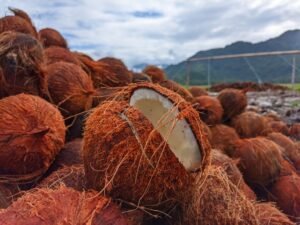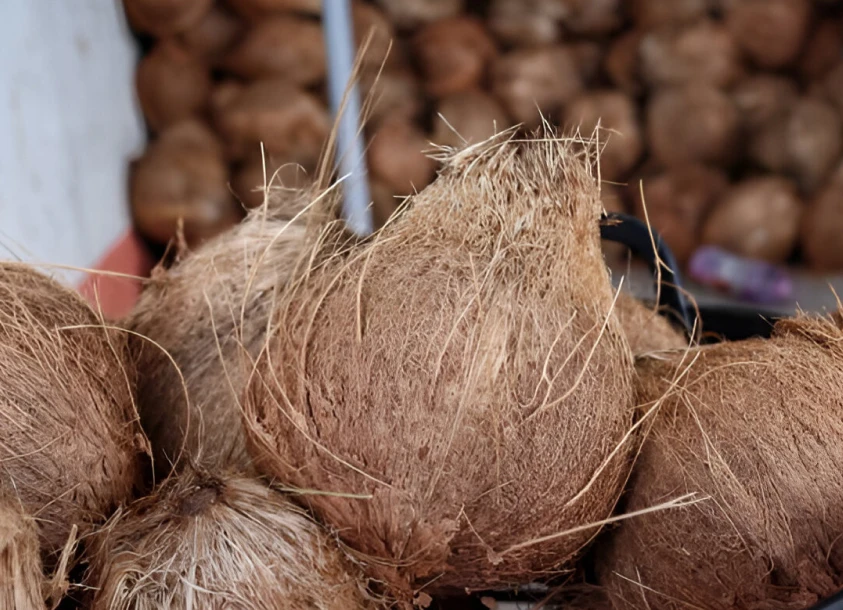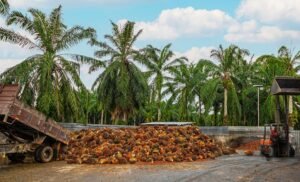
Everything You Need to Know About Buying Coconuts with Husk

Why Buyers Prefer Coconuts with Husk
Coconuts with husk provide a premium edge during transportation. The fibrous outer cover protects the coconut from physical damage, loss of moisture, and spoilage, and can be stored for longer durations. That’s the reason why most importers, particularly in the Middle East, Southeast Asia, and Europe, prefer husked coconuts directly from Indian exporters.
Value-wise, coconuts with husks command better durability and versatility, as they can be utilized for all sorts of purposes, ranging from cooking and religious purposes to industrial purposes that involve the shell and fiber.
Coconut Quality and Grading Parameters
- Weight Categories: Usually graded between 500 g and 800 g, depending on the buyer’s specifications.
- Maturity Check: Only fully matured coconuts are used for export, as they offer higher kernel content and water retention.
- Visual Inspection: Clean, unbroken husks with no sprouting are preferred.
- Moisture Level: Coconuts are dried post-harvest to prevent excess moisture and fungal contamination during shipment.
End Uses and Diverse Applications
In the oil and food processing sector, once the husk is removed, the inner kernel is utilized for oil extraction, desiccated coconut, and other food-grade coconut products. The husk itself is processed into coir and fibers, which are essential materials for eco-friendly packaging, as well as for making brushes, ropes, and mats.
In industrial applications, the hard shell is used to produce activated carbon and as a source of biofuel. Even tender coconut shells and dry coconut shells are repurposed in handicrafts and sustainable packaging, making coconuts with husk a multi-utility product that offers zero waste across its life cycle.
Logistics and Coconut Supply Chain
- Chennai Port (Tamil Nadu): A major hub for bulk agricultural shipping.
- Tuticorin Port: Offers fast customs clearance and frequent container movement.
- Cochin and Mangalore Ports: Known for handling large volumes of perishable agri-goods with minimal delay.
Buyers can choose from FOB (Free on Board) or CIF (Cost, Insurance, and Freight) pricing terms, depending on their preference. With CIF, the exporter manages everything until delivery at the buyer’s port, offering convenience and cost predictability.
Understanding Coconut Wholesale Price and Bulk Orders
- Seasonality: Prices may rise during off-seasons or festival demand spikes.
- Size and Weight: Heavier coconuts often fetch a higher price due to greater kernel content.
- Packaging Requirements: Buyers can choose between gunny bags or carton box packing; both have different cost implications.
- Delivery Terms: CIF pricing includes freight and insurance, while FOB pricing only covers port-side delivery.
India’s Coconut Export Industry Is Set for Sustained Growth
Indian coconuts with husk remain the top choice in international trade because of their resilience, high quality, and multi-faceted utility. Their applications are far-reaching and expansive, ranging from temple sacrifices to coconut oil factories and eco-products industries.
With reliable husked coconut suppliers all over Tamil Nadu, Kerala, and Karnataka, importers are assured of timely delivery, competitive pricing, and reliability. Moreover, advancements in grading, packing, and port-side logistics have continued to augment India’s leadership in this domain.
For any value-seeking buyer wanting durability and versatility, procuring coconuts with husk from India is an investment decision. Whether you want to collaborate with dry coconut manufacturers, discover uses of coconut husk, or simply acquire the best wholesale coconut cost, India is a trustworthy supplier with sustained export potential.


